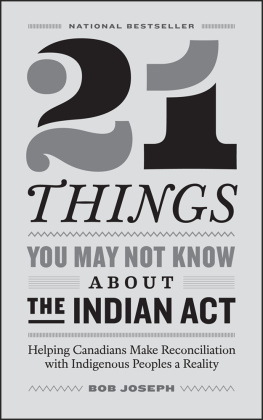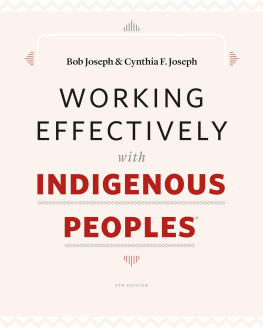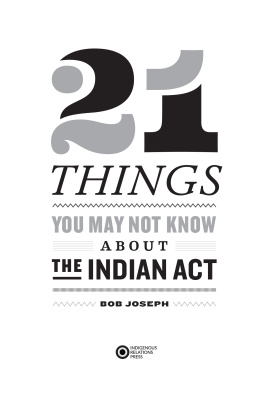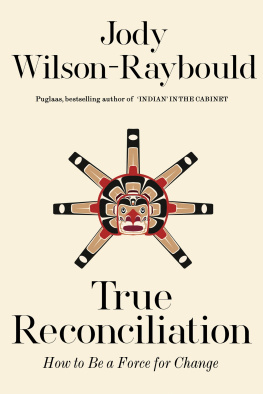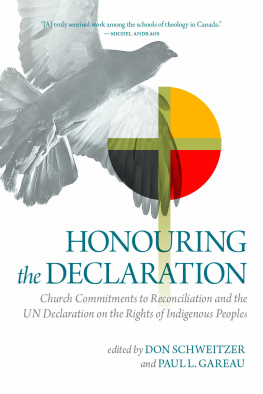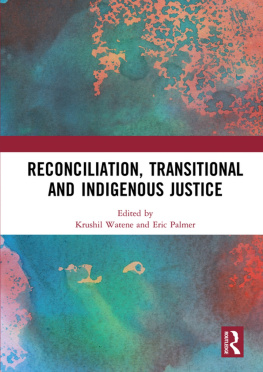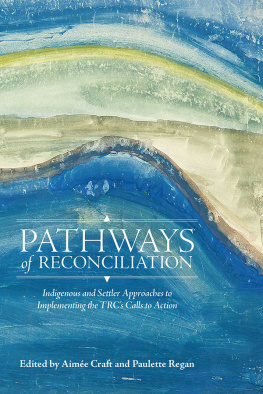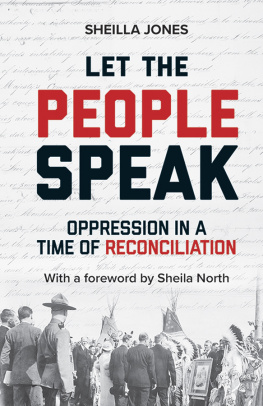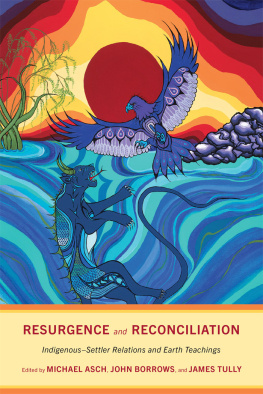Bob Joseph - Indigenous Relations: Insights, Tips & Suggestions to Make Reconciliation a Reality
Here you can read online Bob Joseph - Indigenous Relations: Insights, Tips & Suggestions to Make Reconciliation a Reality full text of the book (entire story) in english for free. Download pdf and epub, get meaning, cover and reviews about this ebook. year: 2019, publisher: Indigenous Relations Press, genre: History / Science. Description of the work, (preface) as well as reviews are available. Best literature library LitArk.com created for fans of good reading and offers a wide selection of genres:
Romance novel
Science fiction
Adventure
Detective
Science
History
Home and family
Prose
Art
Politics
Computer
Non-fiction
Religion
Business
Children
Humor
Choose a favorite category and find really read worthwhile books. Enjoy immersion in the world of imagination, feel the emotions of the characters or learn something new for yourself, make an fascinating discovery.
- Book:Indigenous Relations: Insights, Tips & Suggestions to Make Reconciliation a Reality
- Author:
- Publisher:Indigenous Relations Press
- Genre:
- Year:2019
- Rating:3 / 5
- Favourites:Add to favourites
- Your mark:
- 60
- 1
- 2
- 3
- 4
- 5
Indigenous Relations: Insights, Tips & Suggestions to Make Reconciliation a Reality: summary, description and annotation
We offer to read an annotation, description, summary or preface (depends on what the author of the book "Indigenous Relations: Insights, Tips & Suggestions to Make Reconciliation a Reality" wrote himself). If you haven't found the necessary information about the book — write in the comments, we will try to find it.
Bob Joseph: author's other books
Who wrote Indigenous Relations: Insights, Tips & Suggestions to Make Reconciliation a Reality? Find out the surname, the name of the author of the book and a list of all author's works by series.
Indigenous Relations: Insights, Tips & Suggestions to Make Reconciliation a Reality — read online for free the complete book (whole text) full work
Below is the text of the book, divided by pages. System saving the place of the last page read, allows you to conveniently read the book "Indigenous Relations: Insights, Tips & Suggestions to Make Reconciliation a Reality" online for free, without having to search again every time where you left off. Put a bookmark, and you can go to the page where you finished reading at any time.
Font size:
Interval:
Bookmark:
Copyright 2019 by Bob Joseph and Cynthia F. Joseph
All rights reserved. No part of this book may be reproduced, stored in a retrieval system or transmitted, in any form or by any means, without the prior written consent of the publisher or a licence from The Canadian Copyright Licensing Agency (Access Copyright). For a copyright licence, visit www.accesscopyright.ca or call toll free to 1- 800-893-5777.
Cataloguing in publication information is available from Library and Archives Canada.
ISBN 978-1-989025-64-2 (paperback)
ISBN 978-1-989025-81-9 (ebook)
Indigenous Relations Press | Page Two Books
www.pagetwo.com
Edited by Amanda Lewis
Copyedited by Tilman Lewis
Proofread by Crissy Calhoun
Cover design by Peter Cocking
Interior design by Taysia Louie
Ebook by Bright Wing Books (brightwing.ca)
19 20 21 22 23 5 4 3 2 1
Distributed in Canada by Raincoast Books
www.ictinc.ca
Thanks for picking up this book.
Doing so shows that you are interested in joining so many others on the journey to reconciliation. The insights, tips, and suggestions included here are all practical and doable. Were sure you will have some aha! moments as you read. You may even have some oh no! moments that make you squirm. Dont feel bad. Were all on this learning journey together, and together we will make this world a better place.
Gilakasla
Bob Joseph
Cynthia F. Joseph
A fter we published 21Things You May Not Know About the Indian Act, a lot of people asked me what they could do to further reconciliation in Canada. Indigenous Relations is intended to support that goal of reconciliation by offering practical insights, tips, and suggestions for your business interactions and personal relationships with Indigenous Peoples. While some of this book is intended for the corporate sector, the history, terminology, and advice are of value to all Canadians. Its important for everyone to understand the background to common issues experienced by Indigenous Peoples and communities, from barriers to employment to why protecting the environment long-term is more important than providing employment short-term.
My wife and business partner, Cynthia F. Joseph, and I think of reconciliation as a journey of learning and discovery. By understanding and respecting our cultural differences, we can move toward full reconciliation between Indigenous and non-Indigenous peoples. By reading this book and working to improve your personal and business relationships, youre taking a step on that journey.
Incorporating reconciliation daily in your life and work is the best way to undo the legacy of the Indian Act. The term reconciliation carries a great deal of responsibility for a better future, but it also points to the need to recognize the shameful history of Canadas past relationship with Indigenous Peoples as well as the ongoing outcomes of those policies. The path to reconciliation began in 1982 when the rights of Aboriginal Peoples were recognized in Section 35 of Canadas Constitution Act. The next milestone on the journey was in 1998 when the federal government made the Statement of Reconciliation, thereby acknowledging government-inflicted damage on Indigenous Peoples. Ten years later, then prime minister Stephen Harper delivered a formal apology to residential school survivors and their families, saying, The treatment of children in Indian Residential Schools is a sad chapter in our history. However, no substantive improvement in the lives of Indigenous Peoples followed the apology. The government continues to underfund communities and do battle in the courts over Aboriginal Rights, Title, and land claims.
In 2015, the Tralls to Action, guidelines for moving forward together in a spirit of reconciliation. The Calls to Action cover many sectors such as education, media, and sports. The 92nd Call to Action focuses on how respectful business dealings can contribute to reconciliation.
Business and Reconciliation- We call upon the corporate sector in Canada to adopt the United Nations Declaration on the Rights of Indigenous Peoples as a reconciliation framework and to apply its principles, norms, and standards to corporate policy and core operational activities involving Indigenous peoples and their lands and resources. This would include, but not be limited to, the following:
- Commit to meaningful consultation, building respectful relationships, and obtaining the free, prior, and informed consent of Indigenous peoples before proceeding with economic development projects.
- Ensure that Aboriginal peoples have equitable access to jobs, training, and education opportunities in the corporate sector, and that Aboriginal communities gain long-term sustainable benefits from economic development projects.
- Provide education for management and staff on the history of Aboriginal peoples, including the history and legacy of residential schools, the United Nations Declaration on the Rights of Indigenous Peoples, Treaties and Aboriginal rights, Indigenous law, and AboriginalCrown relations. This will require skills-based training in intercultural competency, conflict resolution, human rights, and anti-racism.
Reconciliation needs to pair intention with doing in order to be effective. So this book offers practical tips for carrying out that 92nd Call to Action. Active reconciliation (sometimes referred to as Reconcili ACTION ) in Canada consists of honouring treaties and acknowledging and respecting Aboriginal Rights and Titlewhich could mean returning lands or accepting Indigenous models of self-government.
Many people worry that the common use of reconciliation in discussions about decolonizing educational institutions, government agencies, and the legal system, as well as in corporate mandates, could result in it becoming a mere platitude. Without action, reconciliation is yet another empty promise, and over the decades Indigenous Peoples have heard plenty of thosesuch as to honour the treaties, ensure access to safe drinking water and adequate housing, and establish equity in employment, education, and health care.
This book explores crucial background material, including the United Nations Declaration on the Rights of Indigenous Peoples ( UNDRIP ), terminology, and treaties. It will also give you concrete steps for appropriate relationship building, including making land acknowledgements and following protocols, what to do or say, and what to avoid doing or saying. All of this information is practical and effective. Much of it stems from my decades as an Indigenous relations trainer; much of it stems from being an Indigenous person who has had the benefit of spending time with chiefs, elders, and other prominent Indigenous people; and much comes from being an intergenerational survivor of the residential school system and an Indigenous person who has witnessed and experienced the systemic racism that is the Indian Act.
A key first step on your reconciliation journey is to be culturally competent. Many of the TRC s Calls to Action include the common element of training in cultural competency, which means having the knowledge, skills, and attitude to work across cultures. You might also know this element as intercultural communication or as a commitment to multiculturalism. If you havent taken Indigenous cultural competency training, such as our training courses, or havent lived in an Indigenous community, you may lack essential understanding of how integral cultural competency is to reconciliation. This book will help you become more culturally competent by increasing your knowledge of Indigenous Peoples in Canada. Incorporating reconciliation into your work and daily life means acknowledging and letting go of negative perceptions, myths, and stereotypes, so well also do some myth busting in this book.
Next pageFont size:
Interval:
Bookmark:
Similar books «Indigenous Relations: Insights, Tips & Suggestions to Make Reconciliation a Reality»
Look at similar books to Indigenous Relations: Insights, Tips & Suggestions to Make Reconciliation a Reality. We have selected literature similar in name and meaning in the hope of providing readers with more options to find new, interesting, not yet read works.
Discussion, reviews of the book Indigenous Relations: Insights, Tips & Suggestions to Make Reconciliation a Reality and just readers' own opinions. Leave your comments, write what you think about the work, its meaning or the main characters. Specify what exactly you liked and what you didn't like, and why you think so.

